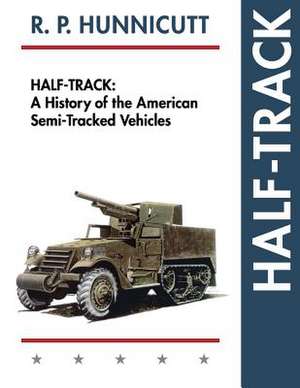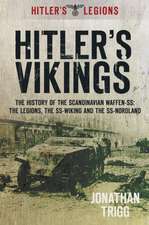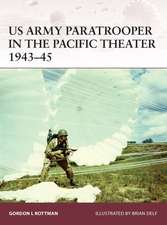Half-Track: A History of American Semi-Tracked Vehicles
Autor R. P. Hunnicutten Limba Engleză Paperback – 19 apr 2015
Featuring over a thousand photos from the National Archives, diagrams, and detailed specifications, Hunnicutt's "Half-Track" remains the definitive development history of half-track vehicles for the military historian, professional soldier, and tank restorer.
In this ambitious work, Hunnicutt details the developmental history of half-tracks, examining its modifications and effectiveness. Products of a pre-war development program, half-track vehicles served in all theaters of operation from the first to the final days of WWII, and many models remained active long after the Korean War. The armored half-track was one of few vehicles available to equip the new divisions being formed just prior to WWII.
Part I traces the early development beginning with the slow half-track of WWI to the faster vehicles developed after the evaluation of the French Citroen-Kegresse P17 in 1931. These vehicles were unarmored half-track cars and trucks intended for use as prime movers and reconnaissance vehicles.
In 1938, the half-track suspension was installed on the M2A1 scout car, and the converted vehicle became the half-track personnel carrier T7. This was the first armored half-track, but tests showed that it was underpowered. Based upon the experience with the T7, a new vehicle was designed in 1939 and designated as the half-track scout car T14. Using the half-track suspension from the T7 and a more powerful engine, it became the prototype for all of the half-tracks produced during WWII.
In Part II, the development and production of half-tracks during WWII is described showing the many roles for which it was adapted. In addition to the original armored scout car, the basic chassis was adapted as a personnel carrier, mortar carrier, tank destroyer, self-propelled artillery, and other specialized applications. Some of these vehicles were temporary expedients, but others were so successful that they remained in use until long after WWII.
Part III briefly describes some half-track operations during WWII and Korea. However, it is not intended to be an operational history, but to illustrate the effectiveness of the half-track in active service. The characteristics of the various half-track vehicles and the weapons with which some of them were armed are tabulated in the data sheets in Part IV.
Richard Pearce Hunnicutt (1926-2011) enlisted in the 7th Infantry Division in 1944 and in 1945 was promoted to sergeant and awarded the Silver Star for his heroic actions. After WWII, Hunnicutt earned a Masters in engineering from Stanford University under the GI Bill. In addition to being one of the most respected metallurgists in California, Hunnicutt wrote the definitive 10-volume history of the development and employment of American armored vehicles. As a tank historian and leading expert in the field, Hunnicutt was one of the founders of the US Army Ordnance Museum at Aberdeen Proving Ground, MD and was a close friend and frequent contributor to the Patton Museum at Fort Knox, KY.
| Toate formatele și edițiile | Preț | Express |
|---|---|---|
| Paperback (1) | 268.37 lei 6-8 săpt. | |
| Echo Point Books & Media – 19 apr 2015 | 268.37 lei 6-8 săpt. | |
| Hardback (1) | 344.74 lei 6-8 săpt. | |
| Echo Point Books & Media – 19 apr 2015 | 344.74 lei 6-8 săpt. |
Preț: 268.37 lei
Nou
51.37€ • 53.97$ • 43.17£
Carte tipărită la comandă
Livrare economică 12-26 martie
Specificații
ISBN-10: 1626548609
Pagini: 244
Dimensiuni: 216 x 279 x 17 mm
Greutate: 0.77 kg
Ediția:Reprint
Editura: Echo Point Books & Media









